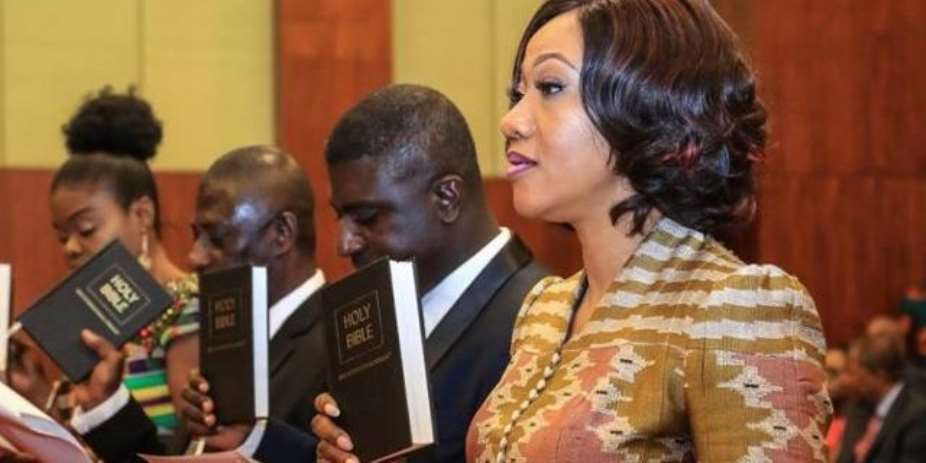The opposition National Democratic Congress (NDC) has made proposals for the country's electoral reforms.
The NDC said there must be prior parliamentary approval for the appointment of the Chairperson of the Electoral Commission and its commissioners.
The proposals were compiled by a team of experts in the NDC led by former Chief of Staff Nana Ato Dadzie and Local Government expert Professor Kwamena Ahwoi.
The recommendations were presented at a stakeholder forum held by the party. The proposed electoral reforms, according to the party, require action by the executive, legislature and bodies other than the EC.
Arguing for the recommendation to have prior parliamentary approval for the appointment of EC members, the NDC said the EC’s critical requirements include independence, neutrality, credibility, transparency and competence and the perception of these requirements.
The party noted that the current mode of appointment “makes the EC appear partisan”, adding: “Representatives of the people must have a hand in their appointment”.
Justifying the proposal, the NDC argued that if the appointment of Supreme Court Justices with similar critical requirements involve prior parliamentary approval, then the appointment of EC Commissioners must not be any different.
The NDC said the Constitution Review Commission (CRC), of which the current EC Chairperson was a member, recommended prior parliamentary approval for the appointment of EC commissioners.
The government White Paper on the CRC Report, the NDC recalled, accepted the recommendation of prior parliamentary approval.
Also, the NDC proposed a repeal of the requirement of the consent of the Attorney General before the prosecution of electoral offences.
It said Section 42 of the Representation of the People Act, 1992, PNDCL 284, requires this consent.
According to the party, the police use the provision “as an excuse for the non-prosecution of high-profile electoral offences”.
“This creates a culture of impunity and undermines fairness and credibility of Ghanaian elections”, the NDC posited.
Justifying the proposal, the NDC said the Attorney General is a “partisan political appointee and a member of an incumbent government” and, so, “faces the difficulty of consenting to the prosecution of such offenders who are, very often, his/her ministerial colleagues or his/her party supporters and activists”.
“The non-prosecution leading to impunity is detrimental to Ghana’s democracy and encourages others to repeat the offences”, the NDC said.
“This proposal was first made by the EC’s own Electoral Reforms Committee in 2015”, the NDC recalled.
The party also suggested “specially-designated courts should be appointed exclusively for electoral disputes and offences before, during and after registration of voters and elections”.
According to the party, “there is undue delay in the adjudication of electoral disputes and offences in Ghana”, noting: “There are no courts with specialisation in election matters in the country”.
The justification for this proposal was that it will “ensure a balance between the need for justice and the need for expedition of judicial proceedings, avoid an illegitimate President being in office for too long, and avoid an illegitimate MP representing the electorate”.
“The proposal takes into account the period required for reviews (Supreme Court) and appeals (Court of Appeal). It will help develop courts with specialisation in election dispute matters”, the NDC said.
It noted that the proposal was first made by the EC’s own Electoral Reforms Committee in 2015.
---classfm





 Limited Voter Registration: NPP, NDC supporters clash over registration of minor...
Limited Voter Registration: NPP, NDC supporters clash over registration of minor...
 Ghanaians can’t continue biting the bullets for your recklessness, irresponsible...
Ghanaians can’t continue biting the bullets for your recklessness, irresponsible...
 Akufo-Addo's remarks over power threatening — NDC
Akufo-Addo's remarks over power threatening — NDC
 Minority demands reversal of dialysis fee hike
Minority demands reversal of dialysis fee hike
 Uncontrollable tears as late John Kumah goes home today
Uncontrollable tears as late John Kumah goes home today
 May 18: Cedi sells at GHS14.67 to $1, GHS13.80 on BoG interbank
May 18: Cedi sells at GHS14.67 to $1, GHS13.80 on BoG interbank
 Corruption and arrogance of power have been a major obstruction of Ghana’s progr...
Corruption and arrogance of power have been a major obstruction of Ghana’s progr...
 National Peace Council and Council of State should be abolished — Omane Boamah
National Peace Council and Council of State should be abolished — Omane Boamah
 National Peace Council is bunch of sycophants who have sold their conscience for...
National Peace Council is bunch of sycophants who have sold their conscience for...
 May 18: Rainstorm with strong winds expected in southern Ghana — GMet
May 18: Rainstorm with strong winds expected in southern Ghana — GMet
